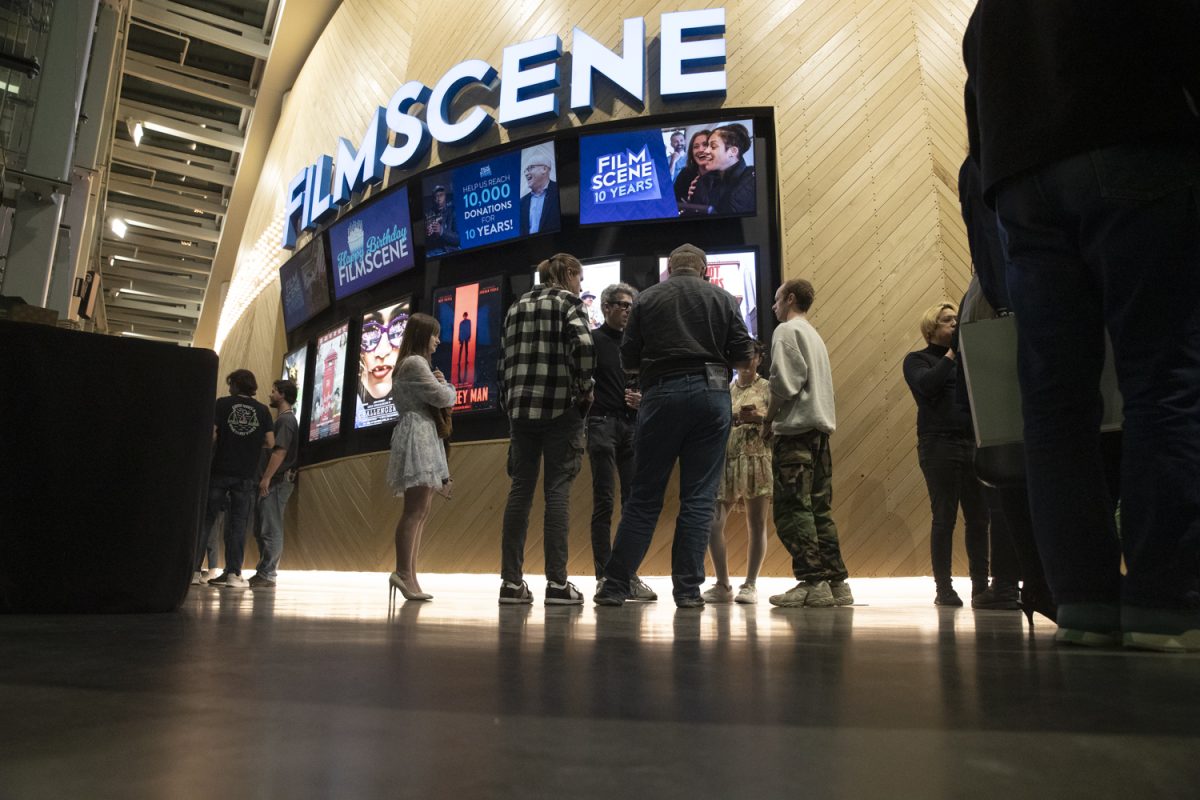This weekend, the 19th annual International Documentary Film Festival, or ICDOCS, took over the downtown Iowa City arts scene. Organized and run by students and staff of the University of Iowa, the festival has been a staple of the burgeoning film community for nearly two decades.
After a three-year hiatus due to a combination of the COVID-19 pandemic and an empty seat at the organizational directing chair, the festival was revived with a fresh program of films beginning April 26.
UI professor Laura Gede is new to the Iowa City film community, but was brought to the university partly to revitalize the festival. During her first year of teaching at the UI, Gede guided students to organize programming, public outreach, and scheduling filmmakers to bring the festival together.
“Putting together a festival is a huge feat and I’m not sure all the students knew exactly what they were getting into,” Gede joked. “But they have all knocked it out of the park.”
With such a keen audience, bringing ICDOCS back to the forefront of the movie scene was a no-brainer for Gede.
“Iowa City has a real love for cinema, for what a lot of people would consider outsider cinema. People have a desire to see outside-of-the-box films,” Gede said. “Seeing the community come together is really beautiful.”
The taxing process of organizing such a large event was constantly on the minds of all involved, especially among the programming committee. The festival received over 600 short film submissions when it opened late last year.
This number far exceeded the expectations of the festival’s organizers, so programming committee members split into multiple pairs, each watching around 11 hours of short film submissions.
One pair of programmers, UI third-year Jakob DeLong and the festival’s mascot, Chromeo, shared why they took part in the festival despite the lengthy time commitment.
DeLong is no stranger to festival programming, as he participated in Bijou’s Open Screen film festival in 2023.
“I like movies, I think they’re neat. I thought it would be exciting to put on a festival,” DeLong shared. “It feels like discovering something, finding something really good in the sea of everything that got sent in is a thrill.”
DeLong then translated for Chromeo, who said they participated in the festival because they needed another course credit to graduate. When the pair discussed their favorite films they encountered during the screening process, Chromeo nodded in agreement.
“We got some good stuff out of it. My favorite was from the Czech Republic, it’s about this little rooster called ‘The Rooster.’ It’s a fun one and has this humor to it,” DeLong said. “I’m anticipating seeing how everyone reacts.”
Programmers aren’t the only similarity between ICDOCS and Open Screen, though, as this year marked the first time Bijou’s short film festival was put on as part of ICDOCS’ lineup. This collaboration is a testament to how ingrained student experience is in the festival’s mission.
The process of putting on the festival kicked off in a classroom led by Gede at the start of the spring semester. All planning for the festival operated through the class, as students like DeLong split off to pick films or began marketing campaigns by reaching out to community liaisons like FilmScene, Public Space One, Out of the Archive, and other local businesses.
In the scheduling of ICDOC’s programming, films are split into different categories. Community collaborations like Out of the Archive’s season finale screening, competitive screenings that were up for awards at Sunday night’s ceremony, and juror’s picks screenings.
Important in every festival circuit, the juror-picking process was important to Gede. She sought to find experienced filmmakers and programmers, and in the end found two experts in both areas: Sara Sowell and Brittany Gravely.
“I found them through Christopher Harris and Hannah Bonner who pointed me in the direction of these wonderful people. Both jurors brought amazing 16mm film prints for us to show,” Gede said. In a time when celluloid [film strips] are not as popular, it’s so cool to get those here in Iowa City.”
At the end of the juror’s deliberation process, the awards ceremony began. Two major awards were handed out — one from the jurors and one from the ICDOCS staff.
Dominick Rivers’ “When Seeds Say Enough” brought home the Staff Pick award while Jacob Kessler’s “Radio Jammer” was awarded Best in Show.
With all the organizing that goes into a festival, Gede and her students were glad to have pulled off a successful return to what made ICDOCS a staple of the film community years ago. Although organizers have rotated, the mission remained the same.
“We have films that don’t play in cinemas around the country, especially short films that aren’t seen anywhere else,” Gede said. “A lot of these are no-budget or low-budget films that don’t get a lot of screen time in Iowa City. It’s rewarding.”



